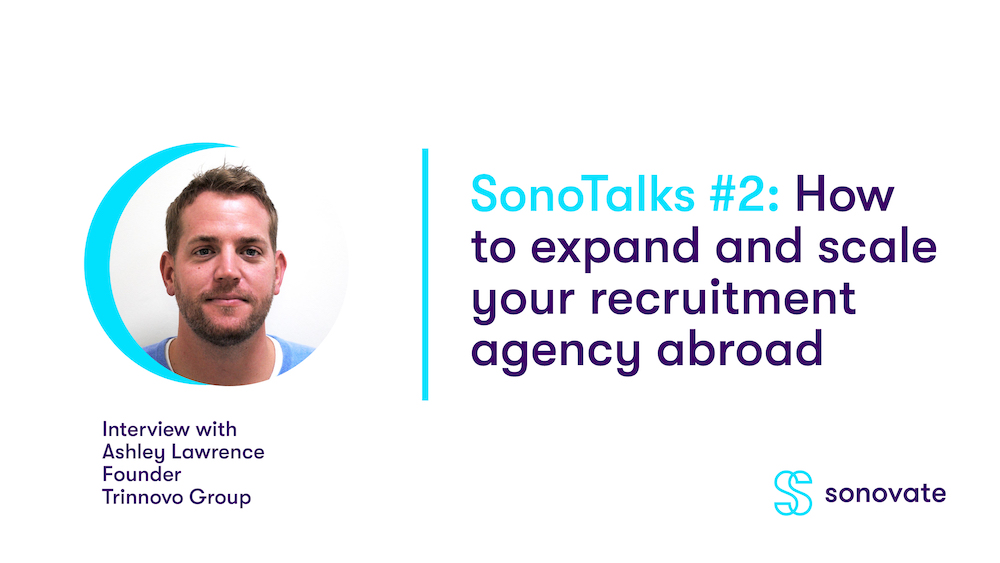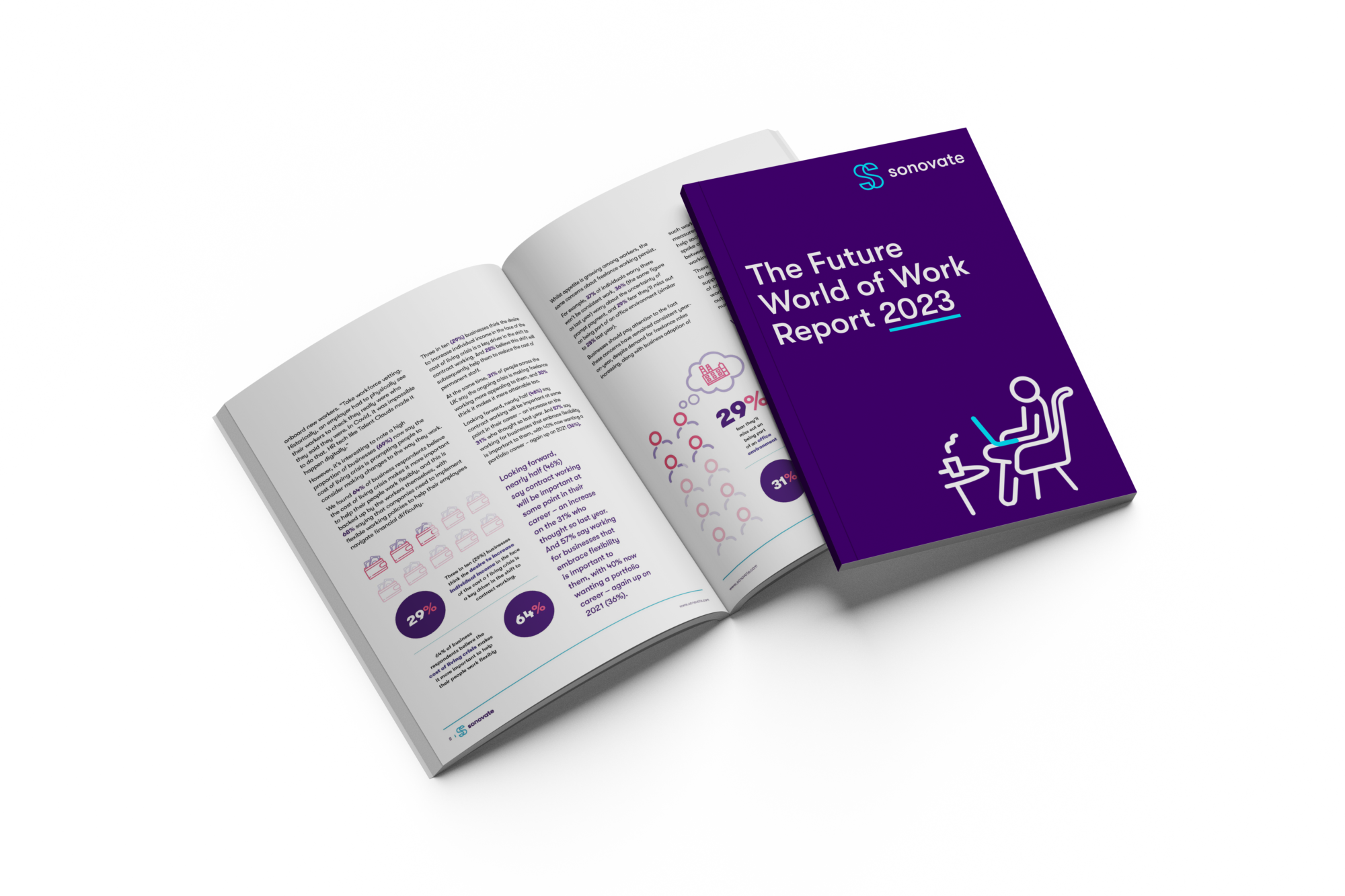SonoTalks #2: How to Expand and Scale Your Recruitment Agency Globally. Interview with Ashley Lawrence, Founder of Trinnovo Group
In this blog series, we interview industry-leading professionals to share their experience and outlook for the market. Our guest is Ashley Lawrence, founder of Trinnovo Group, a staffing and advisory business, comprising three unique recruitment brands, Trust in SODA, Broadgate and BioTalent; a social enterprise Ex-military careers; and a business consultancy division.

Ashley is an award-winning serial entrepreneur and expert in cracking overseas markets. From starting in the UK, he’s led Trinnovo Group to the US, Ireland, and Switzerland, servicing across the DACH region. Here we ask him to explain what it takes to become a success in exporting a recruitment model.
Hi Ashley, Can you start by telling us why you expanded Trinnovo Group overseas?
We went to Los Angeles because that’s where I wanted to live! That’s the truth. But here’s a more articulate answer. The UK market is saturated. With 40,000 staffing agencies there is margin erosion. We use EBITDA (earnings before interest, taxes, depreciation, and amortization) as an indicator of the overall profitability of our business. And its growth trajectory was no less than 40 per cent a year! If we wanted to maintain that pace, we needed to expand our operations abroad.
Another reason was staff retention. Our best people want to continue their growth curve and working for a company with the ability to offer travel and the chance to internationalise their career is important to them.
The good news is that because the UK market is so competitive it hones your skills. When you expand, you’ll see you have a very good proposition!
Where did you expand to?
We went to LA and then Boston. We also went to Ireland before Brexit and we also operate across the DACH countries Germany, Austria and Switzerland. In hindsight, it would have probably been easier to have gone to Boston before LA as the time differences work better and can be serviced from the London office.
Sending staff to LA is a different proposition because of the distance. There’s a lot of planning involved because you want to support your team and help them setup, while giving them the autonomy to build an office. The time difference can make it hard to stay in touch with the UK. Before you setup, it’s important to plan how you will communicate with your team across time zones to provide them the support they need. My recommendation would be to start on the East Coast, build it up, and then when you are really strong, look further afield.
How similar are the US and Ireland?
Culturally very, very different, so it’s important to do some testing of your hypothesis from a cultural perspective. We examined the opportunity by using LinkedIn talent insights, and market saturation and growth forecasts. We triangulated with other metrics, but this approach can miss the people part, which is the crucial bit. Definitely, cultural differences should be top of mind.
In Ireland our success came from the fact we hired locally and had Irish people in the office. We incubated our training academy there, and made a commitment to invest in talent from that market. It took us time to go through the maturity curve, and to understand the local community. There are cultural differences with the UK which took us time to really understand.
In the US our experience was different. We had a social enterprise called Ex-military Careers and we were able to internationalise very quickly. The US sentiment towards veterans is ahead of where we are in the UK and we benefited from that. Our product offering was unique. We found barriers to entry higher than in the UK. It takes a lot of investment and there’s a systematic process to follow. But that was a challenge that we were happy to take up. It means it’s not going to be easy for competitors.
How did you find your first clients abroad?
We took our clients in the UK and looked at the concentration of where they are based internationally. Our hypothesis was that we could internationalise those clients. They are in industries such as software, engineering, banking, and pharmaceutical. LA and Boston are two of the biggest hubs for those industries. In Europe, the DACH markets are too. So we used our strong customer base to build up. We followed the heat maps of our international clients.
Which countries would you recommend?
Hmm. I should recommend somewhere tricky like Kazakhstan if our competitors are reading this!
Look, it’s no secret that the healthiest markets are the kind that offer the best opportunities. The US, Germany, and Italy are going to be attractive. But you need staff to be willing to move. Japan is always in the Top 3 in the SIA staffing report, but we’ve stayed out of it, because it was trickier to find the right staff and relocate them. It all comes down to people. We prefer to move people internally rather than hire externally. We want ‘Culture Carriers’, who can promote the values and the way we do things in a new market.
Do you outsource stuff like finance and legal affairs?
We don’t. If you are small, up to 80 people, it may be too expensive to hire a chief compliance officer or chief financial officer. But it’s great to have those as permanent staff when you can afford it. And frankly at a certain size there are no cost savings to outsourcing. You are paying the same or more, so hire full time for those key positions. We prefer to keep those key positions in-house, and I recommend others do so too as early as they can. We use external resources for funding, which is Sonovate and that helps our team to have the right working capital to support our plans.
What advantages do UK companies have when scaling abroad?
The UK is a very developed and mature market. Companies develop their skills fast. There is also an understanding of how to scale and how to become compliant. UK firms tend to know about tools such as contract perm, embedded hiring, retainers, and all the different kinds of product offering and innovation that comes from working in a saturated market. When you head abroad those skills will be extremely valuable.
It’s like they say in the Marines, if you train under tough conditions, you’ll be ready for anything.
How do you work with Sonovate?
I’ve known Rich [Richard Prime, CoFounder and CEO of Sonovate] for a long time. I think Sonovate’s inception was a similar time to our first business, so I’m lucky to have built a close relationship with him. I feel very fortunate that I can get access to a fountain of knowledge by talking to him. I just pick up the phone and Rich makes introductions that probably aren’t part of the normal Sonovate product offering. He suggests partners. And just sound boarding in terms of business planning and preparation. So, we make use of the Sonovate financial service, getting fluidity in terms of contracts and payroll, but there’s added closeness because of my relationship with Rich.
You have an executive MBA from Bayes Business School at the City of London University. How did it help you expand abroad?
The MBA was tough! It wasn’t easy, having to spend evenings and weekends studying, to be honest. But it did help me in terms of understanding how to build a robust framework for scale, about market dynamics, supply and demand curves and that sort of thing. Corporate finance even helped me understand value drivers that helped us internationalise. I spend a lot of time looking at EBITDA multiples and how to increase the value of staffing businesses. Because of that we realised we needed to internationalise.
It also helped me with time management. I was running various brands and increasing turnover whist studying which meant I had improve how I managed each minute. There’s also a lot around organisational behaviour. Studying that part of the MBA made me understand the need to put culture ahead of systems operations, control and strategy. Too many businesses think they can just go to, say, Colorado and open an office. But they are missing the culture and people part of that.
The MBA taught me the value of people and culture as front and centre, ahead of process control or strategy. That’s what the MBA taught me above all else.
Quickfire questions: What were the main three challenges of scaling abroad and how did you solve them?
Number one is just communication. When you internationalise, the continuity between different officers is really important. So communication becomes more difficult depending on the time difference of where you are. How do you overcome that? Just by being very conscious of the need to communicate and therefore over communicate and not make any assumptions.
Number two is the people part. Getting the culture right. Part of the answer that is what I call Culture Carriers. These are people that are a good fit for your business, with the right attitude and high standards. This includes the way they treat other people, the right values. They are going to have a big role as you internationalise.
And three is the regulatory environment and the need to stay compliant. That changes for each territory you are in. We now have a head of compliance. Before that we probably would have leaned on a partner such as Sonovate to upskill us and educate us in what we need to do to trade.
Final advice for other companies looking to expand abroad?
Sure. Don’t spend too much time focussing on market conditions. You can’t control them. Focus on the people and culture part. Get that bit right. Because if you’ve got a fantastic person, you could put them in a phone box anywhere in the world and they would be successful. And they’d teach others how do it too! Put culture and people first, over systems and processes, and you’ll be off to a strong start.
Thanks Ashley! We hugely appreciate your insights
Huge pleasure! Thank you for listening.




